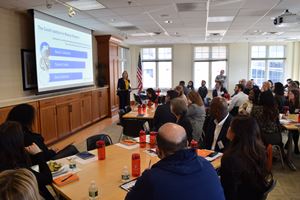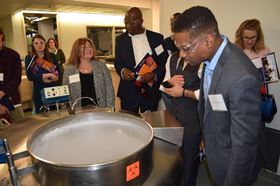
On Monday, March 2, Coriell hosted rare disease advocates and scientists alike for its first annual Rare Disease Day at Coriell, an event celebrating the important role that patient advocates play in advancing science.
For decades, Coriell has been involved in rare disease research and has collaborated with the rare disease community. The National Institute for General Medical Sciences created its biobank, the Human Genetic Cell Repository, at Coriell in the early 1970s and that collection has grown to represent more than 1,000 genetic diseases. The Repository team works directly with individuals affected by rare, heritable diseases as well as the foundations which organize and advocate for research.
“The NIGMS Repository offers an amazing opportunity for patients and their families to participate in research” said Coriell’s Deborah Requesens, PhD, the principal investigator of the NIGMS collection, “by being a part of this Repository, they can be involved in the search for new treatments and cures for their diseases.”
As important as this central biobank is, the day was about the passionate advocates who tirelessly organize, educate themselves on these complicated diseases, and make this research possible.
“As a new family, you get this new diagnosis and the doctor can’t tell you much about it. It rocks your world,” said Jeff D’Angelo, founder of the CHAMP1 Research Foundation, when telling the story of his son JJ. “He’s a fighter and we’ve been fighting for him since day one.”
D’Angelo was one of two speakers Monday with a personal connection to the disease he fights for. His son is one of just dozens diagnosed with CHAMP1 world-wide, a genetic disease which causes developmental delays in children. His message was one of fierce determination.
“I’m trying to soak up as much as I can, so I can be as effective as possible,” he said of getting involved with research. “Be relentless. Don’t let yourself feel unqualified.”
Nasha Fitter is the CEO of the FOXG1 Research Foundation. After her daughter Amara missed developmental milestones and was diagnosed with FOXG1 syndrome, she got involved herself and is tackling research.
Her talk on Monday demonstrated the importance of building a patient registry, biobank, and a natural history study to expedite the work with research.
“Funding is a huge problem,” Fitter said. “Having to raise $3 million dollars just to get basic science off the ground, it’s a really big problem.”

He detailed a new program of the Center’s called Jump Start which helps new foundations navigate the first steps in research advocacy. This program can connect these groups with researchers that might be of assistance and help them hold meetings to identify the key questions they should be answering when developing their research plans.
“All of us, even if we aren’t affected by a rare disease, can participate in rare disease fundraisers,” Dr. Carrington said. “If you look in your community, there’s at least one or two people that is affected and you just may not know it. When we have events like the Million Dollar Bike Ride, use those events to participate."
Outside of Rare Disease Day at Coriell, a team from the Coriell Institute also made the trip to Rare Disease Day at the NIH to network and collect new samples.